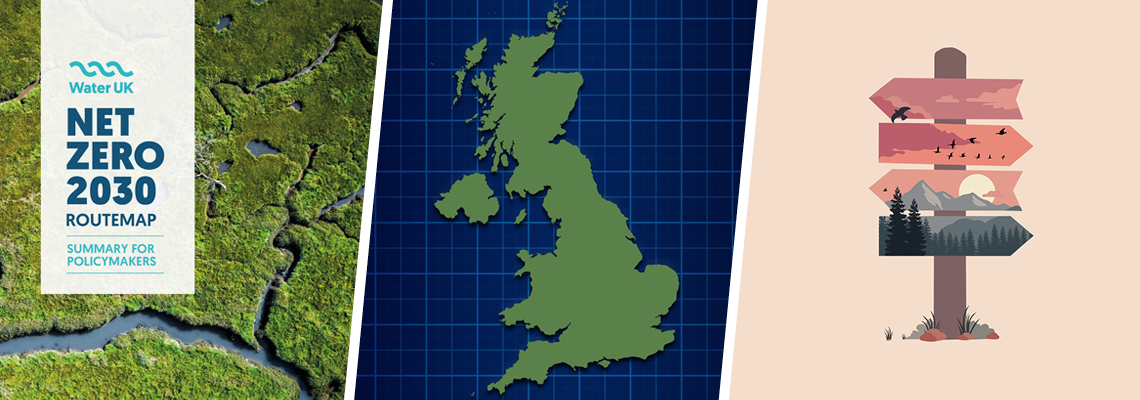The world’s first sector-wide plan to deliver net zero carbon emissions by 2030 has been launched by Water UK as the nation aims to lead the globe in tackling climate change. With a 10-point plan for decarbonisation, including recommendations for government, regulators and the industry, the route map aims to accelerate achieving the zero-carbon goal by decades.
Tackling the carbon challenge for water
According to trade group Water UK, water companies collectively produce almost a third of UK industrial and waste process emissions and therefore have a major role to play in tackling climate change.
The Net Zero 2030 Route map sets out the industry’s vision for reaching net zero two decades ahead of the UK government’s legally binding target of 2050.
Sector-wide annual emissions of 2.4 million tonnes of CO2e suggest the industry could save the emission of 10 million tonnes of greenhouse gas by reaching net zero by 2030.
Developed by consultancies Ricardo and Mott MacDonald, the strategic route map establishes the UK water industry as the first such industrial sector to deliver a detailed plan for net zero carbon on operational emissions.
Designed to offer a range of potential pathways to suit the different requirements of water companies, the strategy shows what is possible opens doors to other industries, the developers say.
“There is a critical relationship between climate change and water resource management, and whatever sector you work in, water will play a significant role in what you do,” said Ricardo CEO, Dave Shemmans. “This is an important report, not just for the water industry, but for all sectors.”
“Greenhouse gas emissions will be addressed through a range of measures such as efficiency, alternative technologies, renewable energy generation and natural sequestration efforts.”
Under the strategy set out in the route map current greenhouse gas emissions will be addressed through a range of measures such as efficiency, alternative technologies, renewable energy generation and contributing to natural sequestration efforts through tree planting, for example.
Any progress on achieving the net zero goal will be independently assessed each year with key milestones reported publicly.
A series of webinars on the route map is due to take place in February next year that will explore relevant net zero solutions and the lessons that can be learned for other sectors.
Building a circular water economy through collaboration
With operational emissions almost halving in the UK water sector since 2011, the new route map aims to make significant progress over the next decade while helping protect customer bills and keep investment costs down. The plan also aims to support the development of green skills and nature-based solutions as part of an economic recovery.
For instance, technologies being recommended include the production of biomethane from sewage waste is expected to heat up to 150,000 homes as well as potentially fuelling transport.
In addition, the development of up to 3 GW of new solar and wind generation capacity that will be sufficient to meet up to 80 per cent of the water industry’s electricity demand, is another key measure.
Meanwhile, restoration of 20,000 hectares of owned peatland and grassland, and the planting of some 11 million trees will help to address any residual emissions coming from the sector. Other operational measures include the widespread adoption of electric vehicles, with 80 per cent of commercial vehicles (LGVs and HGVs) switching to alternative fuels.
Nature-based solutions in Yorkshire
Yorkshire Water is the second-largest landowner in the county and aims to focus much of its efforts on nature-based solutions. For example, it is adopting further measures such as investing heavily in biodiversity and sustainable land management.
“There are no quick fixes, making further progress will be progressively more difficult. That is why it is so important that this is a shared, sector-wide challenge, where we can collaborate, innovate, and succeed.”
The company also said it is well on its way to planting a million trees in the region to offset carbon use and provide natural flood management benefits to local communities.
It has also made substantial investments in anaerobic digestion technologies and has signed a long-term private power purchase agreement that will see 150 Yorkshire Water sites generate electricity with on-site solar.
“Organisations across the board must work together to make this happen at scale and pace,” said Gordon Rogers, head of sustainability at Yorkshire Water.
“The development of national funding for nature-based solutions is a step in the right direction. The water industry is perfectly placed to drive this movement in partnership with the Environment Agency and the government.”
Designing out carbon in new infrastructure
Peter Simpson, CEO of Anglian Water highlighted the potential for innovative technologies to help support action on climate change, for example by using virtual reality, data science and artificial intelligence to ‘design out’ carbon in new infrastructure and optimise asset performance.
“Virtual reality, data science and artificial intelligence could help ‘design out’ carbon in new infrastructure.”
“There’s widespread recognition that COVID, having torn apart our normal way of life, should be a catalyst for positive change. The calls for a green recovery are coming from every direction… both the need and will, to act now to secure a resilient future has never been clearer,” he said, commenting on the route map.
Simpson added: “There are no quick fixes, making further progress will be progressively more difficult. That is why it is so important that this is a shared, sector-wide challenge, where we can collaborate, innovate, and succeed.
“Now is the time for investment - in the infrastructure, technology and skills we need to realise a resilient and secure future, for our region and for our planet."
Joining the net zero club
While the UK is the first nation-wide net zero water strategy, other water companies have already announced similar initiatives.
For example, Portuguese water utility group, Águas de Portugal Group (AdP) set a target to be energy neutral within a decade which includes plans to invest a total of €480 million to bolster energy from biogas, hydro and solar power sources.
Nonetheless, the route map, with its six commitments and four recommendations for other sectors, does establish a significant investment baseline. It estimates that, based on current technologies, potential investment to reach the net zero goal could reach some £4 billion.
However, a broad combination of approaches and collaboration between water companies, policymakers and the supply chain will be needed even with such significant investment.
“Net Zero isn’t something that any one water or wastewater company can achieve alone.”
As Mike Haigh, Mott MacDonald’s executive chairman, said: “Net zero isn’t something that any one water or wastewater company can achieve alone. Every single organisation will have to work with its peers, with the whole of its supply chain, with landowners and with its customers. Government and regulators have pivotal roles in setting the policy and legislative frameworks to enable and incentivise the transition. Net zero by 2030 will be a huge team effort.”
We don’t have all the answers
The Water UK initiative coincided with the launch of Oxford Net Zero programme, which draws on the university’s expertise in policy and climate science to address the critical net zero issue.
Leading academics from across the university’s disciplines will come together to focus on tackling the “difficult” emissions from industry, transport and other sources.
Meanwhile, think tank the Green Alliance has warned that a lack of public investment is creating a major obstacle to overcoming the net zero challenge. Its analysis estimates that for net zero an £11.4 billion gap in investment exists in the current financial year alone, across transport, buildings, circular economy and natural infrastructure.
This gap is projected to grow to reach £13.5 billion per year in the years ahead, with public investment leveraging private sector spending, the organisation argues.
“This Route map is a crucial step forward in setting out the industry’s vision for tackling climate change,” said Christine McGourty, chief executive of Water UK.
“We don't have all the answers, and we can't do it alone. But with the support of the government, regulators and the supply chain, we believe we can deliver a net zero water supply."







